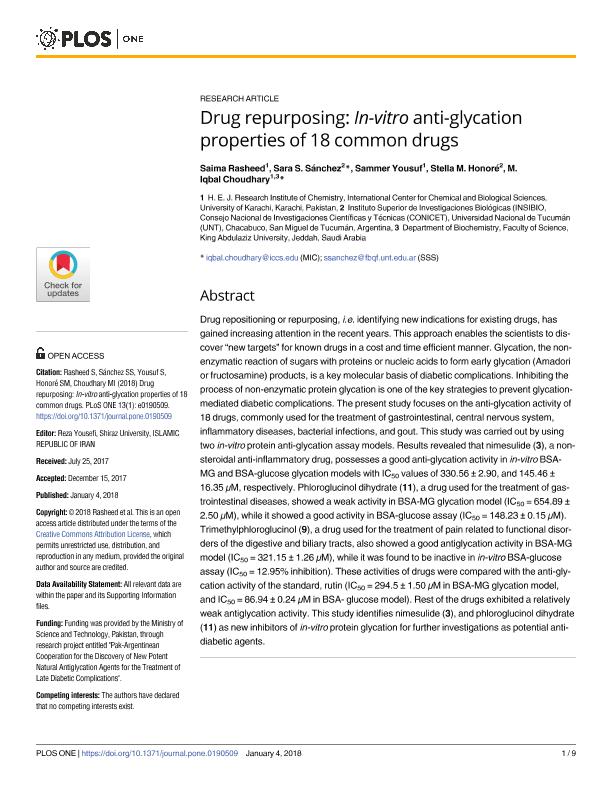Artículo
Drug repurposing: In-vitro anti-glycation properties of 18 common drugs
Rasheed, Saima; Sanchez, Sara Serafina del V. ; Yousuf, Sammer; Honore, Stella Maris
; Yousuf, Sammer; Honore, Stella Maris ; Choudhary, M. Iqbal
; Choudhary, M. Iqbal
 ; Yousuf, Sammer; Honore, Stella Maris
; Yousuf, Sammer; Honore, Stella Maris ; Choudhary, M. Iqbal
; Choudhary, M. Iqbal
Fecha de publicación:
04/01/2018
Editorial:
Public Library of Science
Revista:
Plos One
ISSN:
1932-6203
Idioma:
Inglés
Tipo de recurso:
Artículo publicado
Clasificación temática:
Resumen
Drug repositioning or repurposing, i.e. identifying new indications for existing drugs, has gained increasing attention in the recent years. This approach enables the scientists to discover ?new targets? for known drugs in a cost and time efficient manner. Glycation, the non-enzymatic reaction of sugars with proteins or nucleic acids to form early glycation (Amadori or fructosamine) products, is a key molecular basis of diabetic complications. Inhibiting the process of non-enzymatic protein glycation is one of the key strategies to prevent glycation-mediated diabetic complications. The present study focuses on the anti-glycation activity of 18 drugs, commonly used for the treatment of gastrointestinal, central nervous system, inflammatory diseases, bacterial infections, and gout. This study was carried out by using two in-vitro protein anti-glycation assay models. Results revealed that nimesulide (3), a non-steroidal anti-inflammatory drug, possesses a good anti-glycation activity in in-vitro BSA-MG and BSA-glucose glycation models with IC50 values of 330.56 ± 2.90, and 145.46 ± 16.35 μM, respectively. Phloroglucinol dihydrate (11), a drug used for the treatment of gastrointestinal diseases, showed a weak activity in BSA-MG glycation model (IC50 = 654.89 ± 2.50 μM), while it showed a good activity in BSA-glucose assay (IC50 = 148.23 ± 0.15 μM). Trimethylphloroglucinol (9), a drug used for the treatment of pain related to functional disorders of the digestive and biliary tracts, also showed a good antiglycation activity in BSA-MG model (IC50 = 321.15 ± 1.26 μM), while it was found to be inactive in in-vitro BSA-glucose assay (IC50 = 12.95% inhibition). These activities of drugs were compared with the anti-glycation activity of the standard, rutin (IC50 = 294.5 ± 1.50 μM in BSA-MG glycation model, and IC50 = 86.94 ± 0.24 μM in BSA- glucose model). Rest of the drugs exhibited a relatively weak antiglycation activity. This study identifies nimesulide (3), and phloroglucinol dihydrate (11) as new inhibitors of in-vitro protein glycation for further investigations as potential anti-diabetic agents.
Palabras clave:
ANTI-GLYCATION
,
ANTIDIABETIC AGENTS
Archivos asociados
Licencia
Identificadores
Colecciones
Articulos(INSIBIO)
Articulos de INST.SUP.DE INVEST.BIOLOGICAS
Articulos de INST.SUP.DE INVEST.BIOLOGICAS
Citación
Rasheed, Saima; Sanchez, Sara Serafina del V.; Yousuf, Sammer; Honore, Stella Maris; Choudhary, M. Iqbal; Drug repurposing: In-vitro anti-glycation properties of 18 common drugs; Public Library of Science; Plos One; 13; 1; 4-1-2018; 1-9
Compartir
Altmétricas



